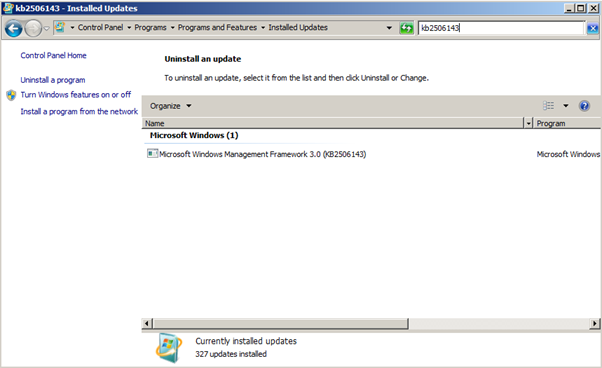Windows Management Framework 3.0 applicability on Windows Small Business Server 2008/2011 Standard
The Windows Management Framework 3.0 (KB2506146 for Windows 2008 SP2 and KB2506143 for Windows Server 2008 R2 SP1) has been recently offered as an optional update on Microsoft update distribution clients such as Windows Server Update Services, and Windows Automatic Update. This update contains the following features:
- Windows PowerShell 3.0
- Windows Management Instrumentation (WMI)
- Windows Remote Management (WinRM)
- Management OData IIS Extension
- Server Manager CIM Provider
If you install these updates on a server running Windows Small Business Server 2008 Standard or Windows Small Business Server 2011 Standard, you will encounter issues with Exchange Server, SharePoint, and the SBS wizards. We have found the following symptoms:
- The Exchange Management Shell may not run properly. Additionally, if you install Exchange Update Rollups, you may see installation errors as mentioned here.
- The SharePoint 2010 Management Shell may not run properly. Our wizards that need SharePoint 2010 Management Shell are affected too.
- Certain SBS wizards such as Connect to Internet wizard, Internet Address Management wizard, and Fix My Network wizard may not run properly
If you see one of the above symptoms on your Small Business Server, check whether one of these updates is installed on the server. In order to check this, you can open Programs and Features from the Control Panel and click on Installed Updates, as:
The above screen-shot is from Windows Small Business Server 2011 Standard. On a Windows Small Business Server 2008 Standard, you should look for “kb2506146”.
You could also run the command Get-Host on a PowerShell prompt to find the version of Windows PowerShell, as:
PS C:\Users\admin> get-host
Name : ConsoleHost
Version : 3.0
InstanceId : e66e1400-9f45-4205-8151-9ed07a1823ba
UI : System.Management.Automation.Internal.Host.InternalHostUserInterface
CurrentCulture : en-US
CurrentUICulture : en-US
PrivateData : Microsoft.PowerShell.ConsoleHost+ConsoleColorProxy
IsRunspacePushed : False
Runspace : System.Management.Automation.Runspaces.LocalRunspace
It will show the PowerShell version as 3.0, which implies that the PowerShell has been updated to the newer version.
In such scenarios we suggest you to uninstall the Update. After the uninstall is complete, clear the contents of %appdata%\Microsoft\Exchange\RemotePowerShell using Windows Explorer to prevent issues with Exchange PowerShell Cmdlets.
Our guidance at this time is that Windows Management Framework 3.0 should not be deployed on a server running Windows Small Business Server 2008 Standard or Windows Small Business Server 2011 Standard.
Update (12/18/2012):
Owing to certain issues with these updates, the same have been expired for all platforms (Windows 7, Server 2008, and Server 2008 R2) as of December 18, 2012, 5:07 pm Pacific Daylight Time.
Update (04/18/2013):
If you have the update (KB2506146 for Windows 2008 SP2 and KB2506143 for Windows Server 2008 R2 SP1) installed on your server, an optional update KB2823180 will be offered through Windows Update.
The update fixes the issues that are described in the following articles:
- 2809215 - Forwarded Events log is unavailable and EventCollector log is not displayed in Event Viewer after you uninstall WMF 3.0 in Windows 7 SP1 and in Windows Server 2008 R2 SP1
- 2781498 - An update is available for Windows Management Framework 3.0 in Windows Server 2008 SP2
- 2809900 - Can't display downloaded English Windows PowerShell 3.0 cmdlet Help files in a localized vesion of Windows 7, Windows Server 2008 R2, or Windows Server 2008 SP2
This update also fixes the following issue:
Assume that you install Windows Management Framework 3.0 on a computer that is running Windows 7 Service Pack 1 (SP1), Windows Server 2008 R2 SP1, or Windows Server 2008 Service Pack 2 (SP2). After you uninstall an update for Windows Management Framework 3.0, binary files are not reverted to their earlier version.
For more information, please visit this link.
